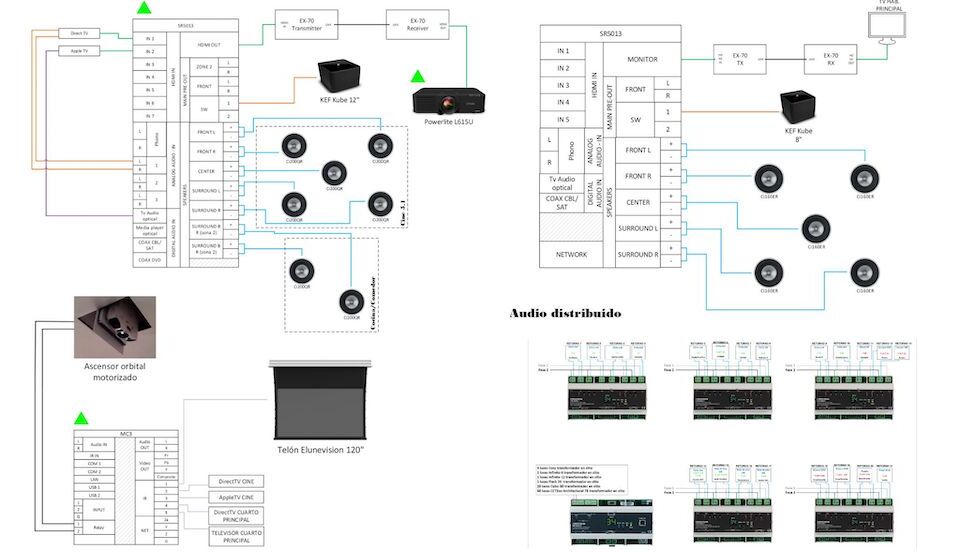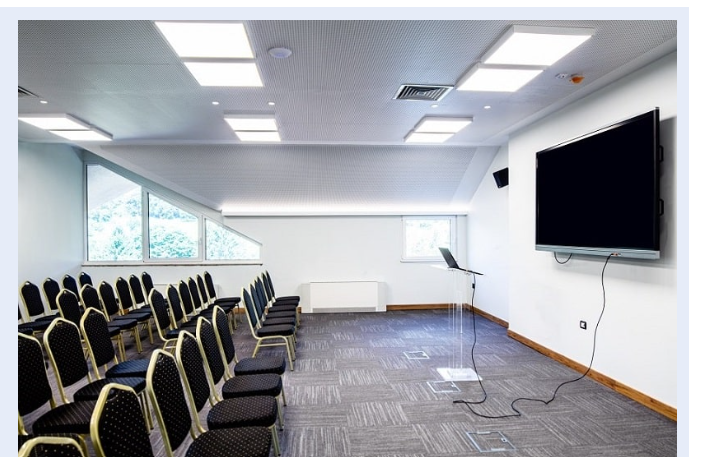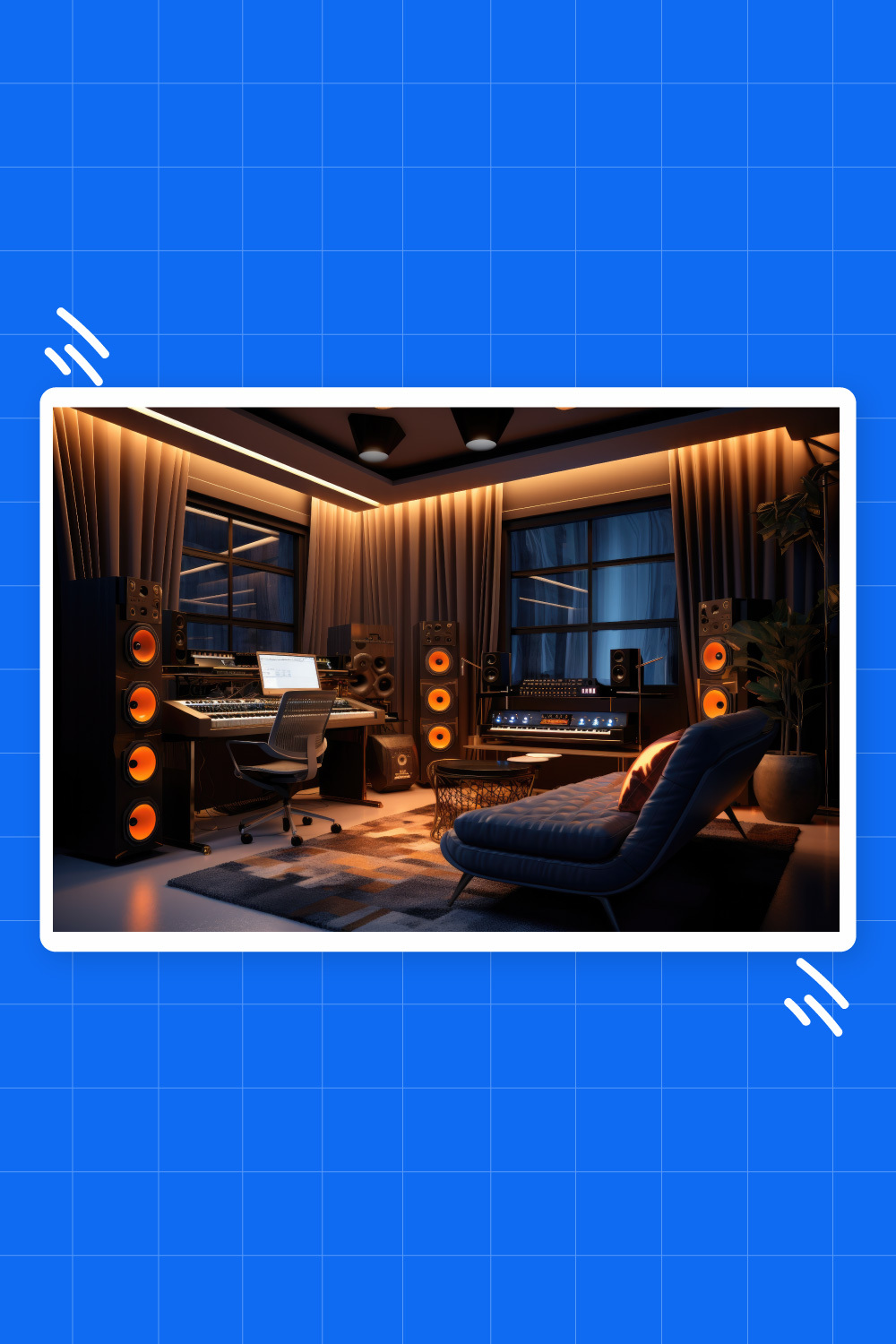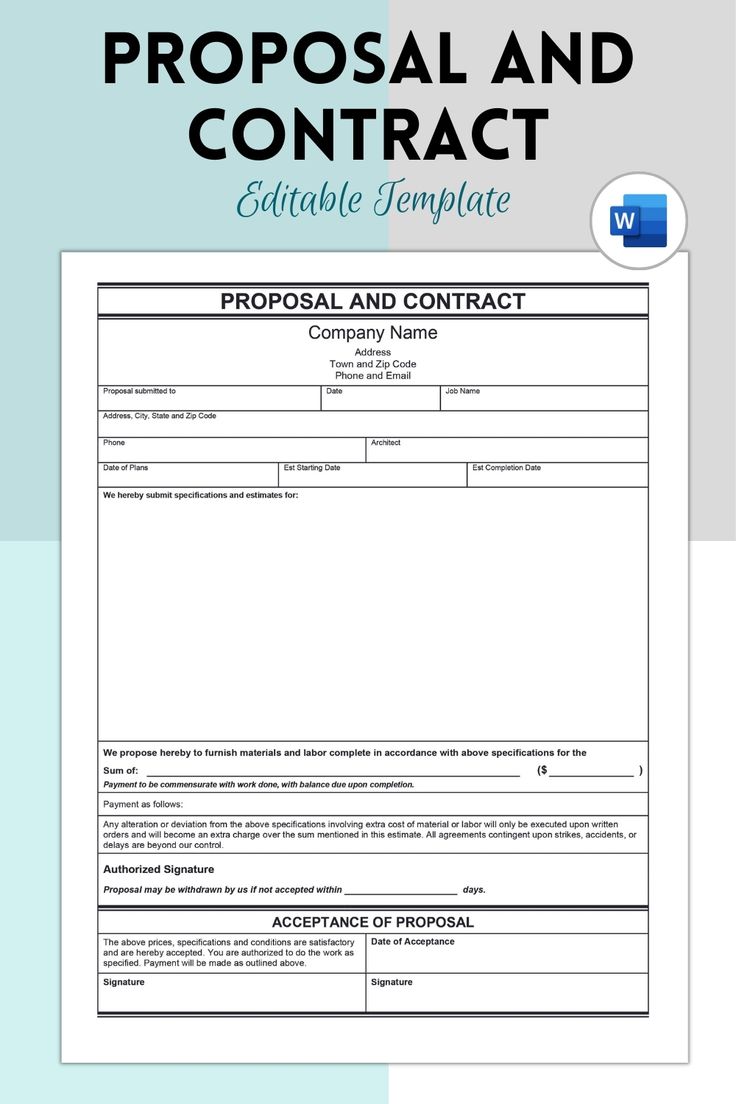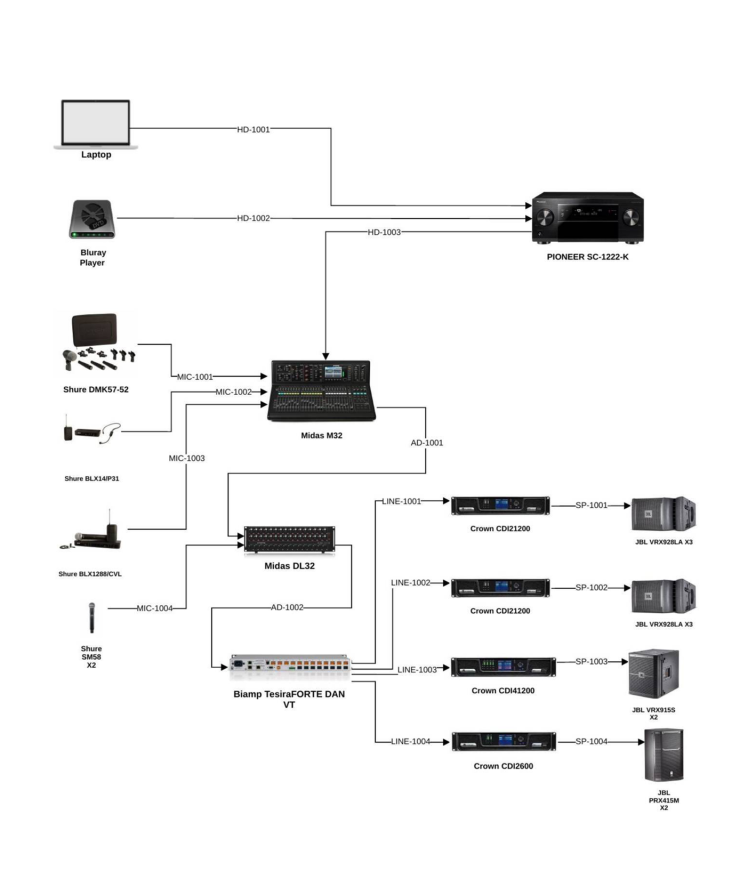How to Use XAVIA for Instant AV Room Designs: From Conference to Classroom
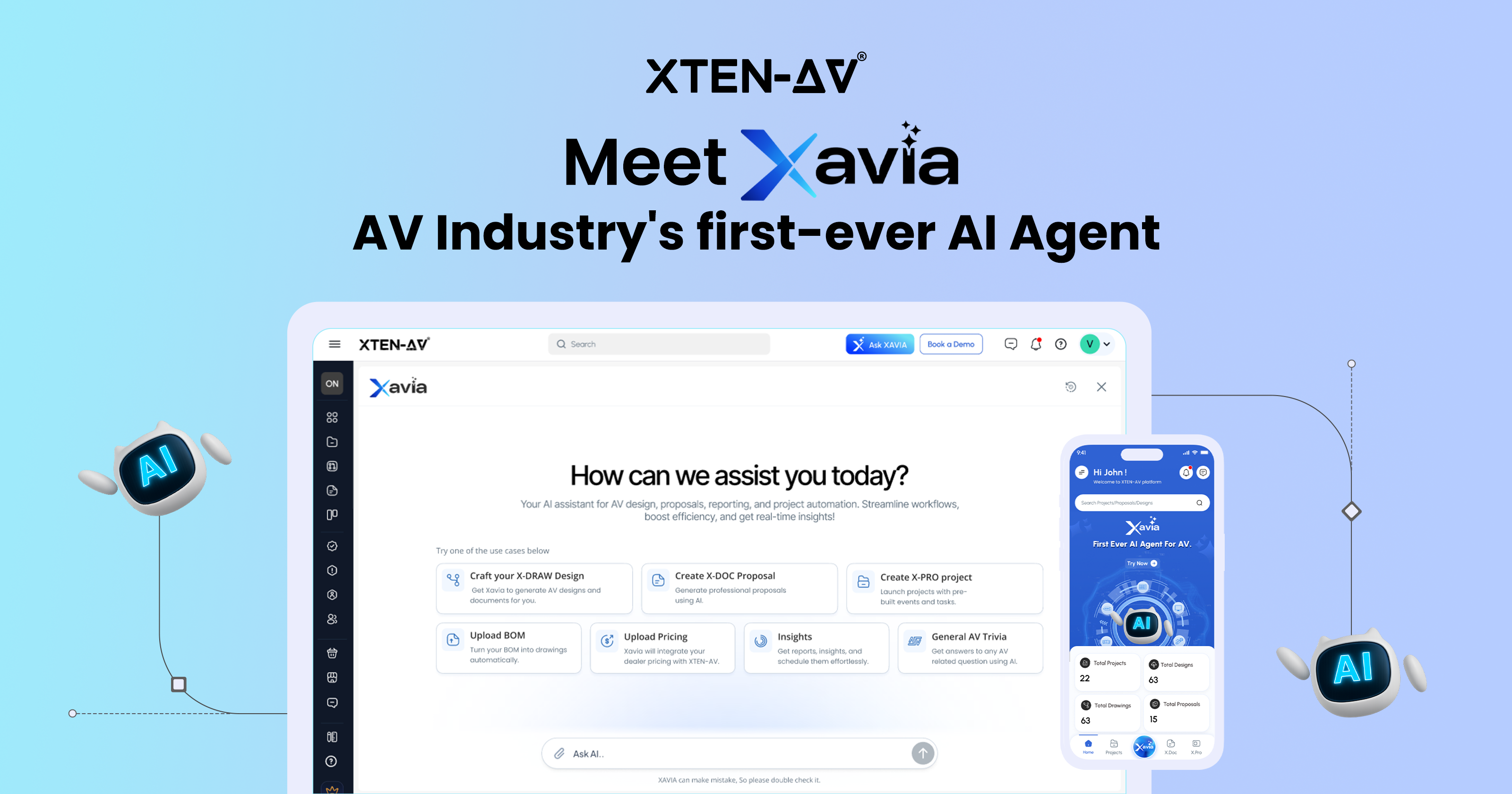
Strong 8k brings an ultra-HD IPTV experience to your living room and your pocket.
Designing AV rooms — from simple conference setups to complex educational environments — has historically been a manual, time-intensive, and fragmented process. Traditional tools like AutoCAD, Excel, and InDesign have served their purpose, but they lack scalability, flexibility, and intelligence.
Today, with the evolution of AI and the increasing complexity of AV deployments, professionals need real-time intelligence, automation, and precision. That’s where XAVIA — XTEN-AV’s industry-first AI agent for AV professionals — comes in.
Whether you’re designing a huddle room, a corporate boardroom, a Zoom-enabled classroom, or an auditorium, XAVIA delivers instant, AI-generated AV room designs — simply through voice or chat.
This article explores how AV professionals, consultants, and integrators can leverage XAVIA for AV Room Designs to save hours, reduce design errors, and improve project delivery.
We’ll also dive into:
The use of AI-Powered AV Project Insights
Real case studies from AV teams worldwide
FAQs based on real user behavior
How it fits into your AV system integration software stack
Let’s explore how to turn spoken ideas into finished room designs — instantly.
The Traditional AV Room Design Workflow – Slow, Manual, and Error-Prone
Legacy Tools and Their Limitations
Designing an AV room involves:
CAD/Visio for drawing
Spreadsheets for the BOM
Emails for collaboration
PDFs for deliverables
While these tools are functional, they’re disconnected and heavily reliant on human effort.
The Key Challenges
Time-Consuming – An average conference room design can take 6–12 hours to complete.
Requires Technical Expertise – CAD and engineering knowledge are prerequisites.
No Dynamic BOM Integration – Manual entry leads to pricing and quantity mismatches.
Lack of Real-Time Intelligence – No suggestions, no cost optimizations, no margin visibility.
Difficult to Scale – Each new room type or site requires repeating the process from scratch.
What Is XAVIA and How It Reinvents AV Room Design
The AV industry has long relied on CAD tools, product spec sheets, and email chains to create room designs that are functional, scalable, and client-ready. This traditional method — while effective in its time — no longer meets the demands of a fast-paced, cloud-first, hybrid-working world.
Enter XAVIA: the first-ever AI assistant built specifically for the AV industry, designed by XTEN-AV.
🧠 What Is XAVIA?
XAVIA is a voice- and chat-powered AI platform that transforms how AV professionals design, quote, and manage rooms. Rather than manually drawing layouts or building BOMs, users simply speak their room requirements, and XAVIA produces:
Intelligent AV schematics
2D/3D room layouts
Signal flow diagrams
BOMs with real-time dealer pricing
Client-ready proposals
All in seconds, not hours.
🚀 How XAVIA Disrupts the AV Design Workflow
Voice-Driven Input
Instead of starting in AutoCAD or Visio, users initiate projects with natural language prompts like:
“Design a training room for 30 people with dual 85-inch displays, wireless mics, and a DSP.”
AI-Powered Room Intelligence
XAVIA leverages a trained AV design model, built on millions of data points and industry best practices. It understands AV categories, acoustic considerations, cable routing logic, and brand compatibility.
No Manual Drawing
Forget block diagrams and signal path sketching. XAVIA auto-generates:
Rack elevations
Ceiling speaker placements
Touch panel locations
Camera zones
Cable pathways
Real-Time Design Feedback
XAVIA instantly checks for:
Equipment compatibility
Network load balance
Power and heat distribution
Room dimensions vs. AV requirements
Integrated AV Proposal Sync
Since XAVIA is part of a larger AV system integration software platform, it automatically connects the design to:
Dealer pricing
Proposal templates
Project timelines
Reporting tools
No More Redundant Workflows
You don’t need to copy and paste from Excel to Word to CAD to PDF. XAVIA manages the entire lifecycle from voice prompt to client sign-off.
Step-by-Step – How to Use XAVIA for Instant Room Design
Let’s break down the complete AV room design process using XAVIA — from first voice prompt to final export — and explore how this revolutionizes your design speed and output.
Step 1: Start with a Voice or Chat Command
Unlike traditional tools that require project setup and template loading, XAVIA starts with a simple command:
💬 “Design a conference room for 12 participants with dual displays, ceiling mics, in-ceiling speakers, and a control touch panel.”
XAVIA’s AI engine interprets:
Room capacity
Functional requirements (presentation, conferencing)
Device types
Required connectivity
Environmental considerations
Step 2: XAVIA Auto-Selects Products and Equipment
XAVIA searches your connected database of over 1.5 million AV products and selects:
Display solutions (based on room size)
Audio DSPs (based on mic type and acoustic modeling)
Cameras (with PTZ, auto-framing, or fixed options)
Cabling & infrastructure
Mounting and control gear
It also considers dealer pricing, compatibility, and availability as it builds the room design.
Step 3: Generate Smart AV Schematics and Layouts
XAVIA automatically builds:
Line schematics
Signal flow diagrams
Rack layouts
2D/3D room drawings
Cable routing maps
These visuals are standards-compliant and can be exported to:
PDF for client viewing
DWG or DXF for engineering
Word format for proposal inclusion
Step 4: Review, Revise, or Customize in Real Time
XAVIA’s interface allows voice-driven editing. For example:
🗣 “Change the microphones to Sennheiser ceiling models.”
🗣 “Remove the HDMI wall plate and add a wireless sharing receiver.”
🗣 “Upgrade the display to 86-inch 4K Samsung.”
Each change dynamically updates the:
AV design
BOM
Cost estimation
Proposal content
Step 5: Instantly Generate a Proposal
With one command:
“Generate proposal for this training room.”
XAVIA creates:
Cover page with your branding
Project overview
Detailed BOM with dealer pricing
Scope of work
Terms and conditions
Suggested upsells or add-ons
Timeline overview
Export options include:
Word (editable)
Web link (interactive)
Step 6: Collaborate with Teams and Clients
XAVIA includes built-in chat and tagging features, allowing:
Designers to leave notes
Sales teams to request revisions
PMs to track approval status
Clients to review without requiring CAD access
You can tag users: “@John please confirm ceiling speaker brand.”
Every version is auto-saved, auditable, and reversible.
Step 7: Track Insights and Approvals
Once the design is accepted, XAVIA:
Logs the milestone in the project timeline
Adds the design to the centralized library
Begins proposal conversion tracking
Provides AI-Powered AV Project Insights on:
Total project cost
Expected margin
Room design efficiency
Reusability of the design across future rooms
🏁 From Idea to Output — In Minutes
With XAVIA, a process that once took:
4–10 hours of engineering time
3 different tools
Back-and-forth emails
Now takes:
5–15 minutes
One tool
Zero friction
Importance of XAVIA for AV Room Designs
1 Democratizing Design Creation
Junior sales engineers can create room layouts
No need to wait for a design resource
Scales design output without hiring
2. Accuracy Through Automation
No errors in compatibility or quantity
Dealer pricing and availability synced in real time
Fewer revisions = faster approval
3. Voice-to-Visual Conversion
Speak a sentence, get a visual. This reduces design latency dramatically and ensures that non-technical staff can contribute to design ideation.
Room-Specific Examples – XAVIA in Action
Conference Room
“Design a boardroom for 16 with dual projectors, wireless sharing, and ceiling mics.”
XAVIA returns:
Room layout
Signal flow diagram
Rack design
Product BOM (displays, DSP, speakers, mic systems)
Classroom
“Create AV setup for a 40-seat classroom with hybrid learning support and ceiling mics.”
XAVIA delivers:
Zoom integration design
Tracking cameras
Central DSP, multi-speaker setup
Rack wiring and projection
Auditorium
“Generate design for 200-seat auditorium with video wall and Dante audio network.”
XAVIA creates:
Multi-zone audio layout
Video switching diagram
Amplification and routing
Stage mic setup
The Role of AI-Powered AV Project Insights in Room Design
XAVIA doesn’t just design — it thinks.
Real-Time Cost Insights
See total system cost as you build
View per-category spend
Set and enforce budget ceilings
Design Efficiency Recommendations
Suggests more efficient cabling
Highlights redundant gear
Compares alternate products
Future-Proofing Recommendations
Alerts when selected devices lack integration potential
Shows upgrade paths
Estimates lifecycle cost vs. upfront cost
Integration with AV System Integration Software
XAVIA seamlessly fits into your existing AV system integration software environment.
Unified Design-to-Delivery Workflow
Design → BOM → Proposal → Project → Reports
No exports, no tool switching
Every step tracked, versioned, and stored in the cloud
Real-Time Data Loop
Pricing, inventory, and compliance updates flow in real time
Reports can be sent to sales, engineering, and project managers
Real-World Case Studies
Case Study 1: Global AV Integrator
Problem: Team of 5 designers needed to support 30 sales reps.
Solution: Empowered sales team to generate initial room designs using XAVIA.
Impact:
90% reduction in design backlog
30% improvement in proposal response time
Saved 60+ hours/week in pre-sales design
Case Study 2: University AV Department
Problem: Manual process for 80+ classrooms across 3 campuses.
Solution: Used XAVIA to generate standardized templates and auto-generate BOMs.
Impact:
Reduced errors across proposals
Unified equipment usage for easier maintenance
Increased stakeholder approval speed by 40%
8 Common User Questions
Q1: Can XAVIA handle multi-room designs?
Yes. XAVIA can build and manage multi-zone, multi-room setups with consistent design logic.
Q2: What if my preferred products aren't listed?
You can upload your vendor catalogs and XAVIA will use them in future designs.
Q3: Does it export CAD-ready files?
Yes. XAVIA supports DXF, DWG, and PDF exports.
Q4: Can non-technical users operate XAVIA?
Absolutely. It’s designed for anyone who can describe a room’s function and goals.
Q5: Does it include compliance and safety checks?
Yes. It follows AVIXA, ADA, and local code standards.
Q6: Can I integrate dealer pricing?
Yes — XAVIA supports dealer pricing integration so costs are always accurate.
Q7: Is it mobile friendly?
XAVIA works on tablets and phones with full voice command functionality.
Q8: What about AV over IP rooms?
XAVIA supports networked AV design, including Dante and NDI-based workflows.
Conclusion: Designing AV Rooms Has Never Been This Fast or Intelligent
From the boardroom to the classroom, AV design has never been this effortless.
With XAVIA, AV professionals don’t have to wait on engineering bandwidth, manually pull together product specs, or worry about misquotes. They simply speak the room into existence — and XAVIA takes care of the design, documentation, BOM, pricing, and proposal.
If you're still designing AV rooms the old way — you're already behind.
It’s time to design smarter. It’s time to design with XAVIA.
Note: IndiBlogHub features both user-submitted and editorial content. We do not verify third-party contributions. Read our Disclaimer and Privacy Policyfor details.



